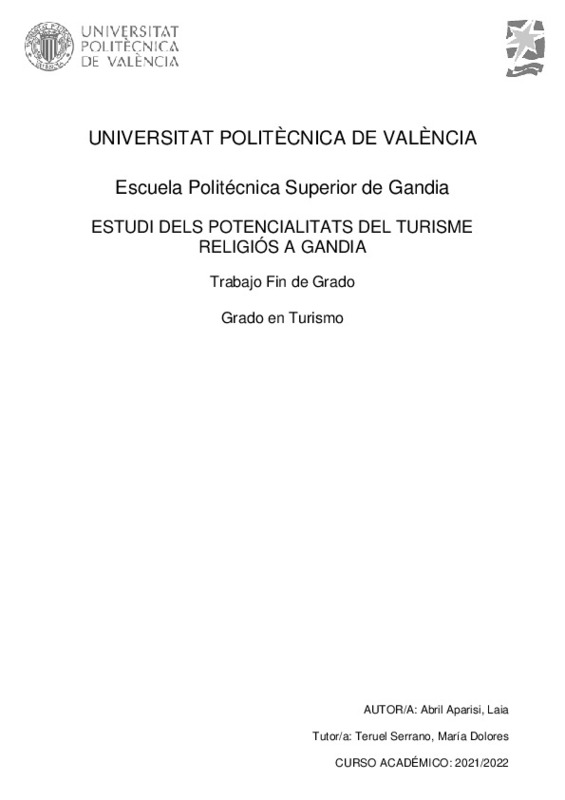|
Resumen:
|
[CA] En aquest treball s’analitzarà la situació actual del turisme religiós, com a una
tipologia de turisme espiritual on el patrimoni, tant l’intangible com el tangible,
constitueix un element fonamental d’aquest tipus ...[+]
[CA] En aquest treball s’analitzarà la situació actual del turisme religiós, com a una
tipologia de turisme espiritual on el patrimoni, tant l’intangible com el tangible,
constitueix un element fonamental d’aquest tipus de turisme i, en particular, el
que podria donar-se a la ciutat de Gandia, així com, la valoració dels atractius
per al visitant. Per d’això, en aquest treball final de grau, es definirà el producte
turístic religiós en un àmbit general, nacional i local, i d’eixa manera poder situar,
i delimitar, el concepte principal. L’objecte d’anàlisi és Gandia (València), com
una de les principals ciutats receptores de turisme de la Comunitat Valenciana, i
la ciutat proposada del nostre interés. Es repassarà l'oferta turística, i es
detallaran quins són els elements que s’atribueixen directament al reclam
“religiós”, especialment vinculats amb: l’Any Jubilar Borgià i la Setmana Santa
com a Festa d’Interés Turístic Nacional. La Setmana Santa és un període molt
concret, l’ànim del nostre anàlisi és valorar altres alternatives patrimonials,
culturals, o artístiques que siguen constants durant l’any, i què trenquen la
estacionalitat perenne de sol i platja, Falles o la mateixa Setmana de Passió. Per
conéixer el grau de coneixement dels atractius adients a la religiositat, es realitza
una enquesta que aportarà una idea real de quin és el nivell d’oportunitats, o si
es genera l'atractiu suficient en els visitants. La consulta es durà a terme
aprofitant les dates de Setmana Santa i Pasqua, a un establiment hostaler a la
Platja de Gandia, entre visitants d’un ventall d’edat divers perquè siga la més
representativa possible. Finalment, mitjançant les conclusions s’aporta el balanç
de la informació obtinguda en les respostes i quins són els nous reptes que
caldria afrontar, així com la manera d’aconseguir-ho.
[-]
[EN] This work will analyse the current situation of religious tourism, as a type of spiritual tourism where heritage, both intangible and tangible, is a fundamental element of this type of tourism and, in particular, what ...[+]
[EN] This work will analyse the current situation of religious tourism, as a type of spiritual tourism where heritage, both intangible and tangible, is a fundamental element of this type of tourism and, in particular, what could be given to the city of Gandia, as well as the enhancement of the attractions for visitors. For this reason, in this final thesis, we will define the religious tourism product in a general, national, and local scope and thus be able to situate and delimit the main concept. The object of analysis is Gandia (Valencia), as one of the main tourist destination cities of the Valencian Community, and the proposed city of our interest. It will review the tourist offer and will detail which are the elements that are directly attributed to the "religious" claim, especially linked to: Jubilee Year of the Borgia and the Holy Week as a Festival of National Tourist Interest. Although Holy Week is a very specific period, the aim of the analysis is to evaluate other heritage, cultural or artistic alternatives that are constant throughout the year, and that break the perennial seasonalities of sun and beach, Falles or the Passion Week itself. In order to find out the level of knowledge of the attractions related to religion, a survey is carried out which will provide a real idea of what the level of opportunities is, or whether it generates sufficient attractive among visitors. The survey will be carried out during Holy Week and Easter, in a hotel establishment on Gandia Beach, among visitors of a wide age range in order to be as representative as possible. Finally, the conclusions provide the balance of the information obtained in the answers and what are the new challenges that need to be faced, as well as the way to achieve them.
[-]
|







